
ACTA MATHEMATICA
Scope & Guideline
Connecting Scholars Through Timeless Mathematical Inquiry
Introduction
Aims and Scopes
- Algebra and Geometry:
The journal publishes significant contributions in algebraic structures and geometric theories, focusing on topics such as algebraic geometry, topology, and the interplay between algebra and geometry. - Analysis and Partial Differential Equations:
A core area of research, the journal includes studies on real and complex analysis, functional analysis, and partial differential equations, highlighting their applications in mathematical physics and other fields. - Mathematical Physics:
ACTA MATHEMATICA encourages research at the interface of mathematics and physics, including topics like quantum mechanics, statistical mechanics, and mathematical aspects of general relativity. - Probability and Stochastic Processes:
The journal explores theories and applications of probability, including stochastic processes and their implications in various mathematical models and real-world phenomena. - Differential Geometry and Topology:
Research on differential geometry, including the study of manifolds and their properties, as well as topological spaces, is a significant focus, showcasing both theoretical and applied perspectives. - Combinatorial and Discrete Mathematics:
The journal features work in combinatorial mathematics, including graph theory and discrete structures, emphasizing their relevance in computational mathematics and algorithm design.
Trending and Emerging
- Geometric Analysis:
Recent papers indicate a rising focus on geometric analysis, particularly in relation to the properties of manifolds and their boundaries, reflecting a trend towards integrating analysis with geometric structures. - Nonlinear Partial Differential Equations:
There is an increasing number of studies addressing nonlinear partial differential equations, emphasizing their well-posedness and qualitative properties, which is crucial for understanding complex dynamic systems. - Random Matrix Theory and Universality:
Research in random matrix theory has gained traction, particularly in its applications to statistical physics and combinatorial mathematics, highlighting the importance of universality in random systems. - Mirror Symmetry and Algebraic Geometry:
The exploration of mirror symmetry and its implications for Calabi-Yau varieties has emerged as a significant theme, reflecting ongoing interests in the connections between algebraic geometry and theoretical physics. - Ergodic Theory and Dynamical Systems:
There is a noticeable increase in publications related to ergodic theory and dynamical systems, which are critical for understanding complex systems and their long-term behavior.
Declining or Waning
- Classical Geometry:
While classical geometry has historically been a staple in mathematical journals, recent publications indicate a waning interest in purely classical approaches, with a shift towards more abstract and rigorous geometric theories. - Elementary Number Theory:
The frequency of publications focused on elementary number theory has decreased, suggesting a transition towards more complex and advanced areas of number theory, such as algebraic or analytic number theory. - Computational Mathematics:
There appears to be a reduction in works centered around computational methods and numerical analysis, possibly due to a growing emphasis on theoretical and abstract mathematical frameworks.
Similar Journals

Analele Stiintifice ale Universitatii Ovidius Constanta-Seria Matematica
Navigating the Future of Mathematics with Rigorous ScholarshipAnalele Stiintifice ale Universitatii Ovidius Constanta-Seria Matematica is a prominent open-access journal established by OVIDIUS UNIV PRESS in Romania, dedicated to advancing the fields of mathematics, specifically in Analysis and Applied Mathematics. Since its inception, the journal has emphasized the dissemination of high-quality research, making it accessible to a global audience. With an ISSN of 1224-1784 and E-ISSN 1844-0835, it has positioned itself within the academic community, achieving a respectable Q3 ranking in both analysis and applied mathematics in 2023, reflecting its commitment to rigorous scholarship. The journal spans a considerable publication window from 2009 to 2024, catering to the ongoing developments in mathematical sciences and their applications. Researchers, professionals, and students alike will find valuable insights and contributions that enrich their understanding and foster collaboration within the mathematical community. The journal's headquarters is based at the Faculty of Mathematics & Computer Science, Bulevardul Mamaia 124, Constanta, Romania.
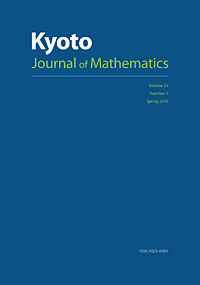
Kyoto Journal of Mathematics
Empowering the global mathematical community through open access.Kyoto Journal of Mathematics is a premier academic publication dedicated to advancing the field of mathematics, published by DUKE UNIVERSITY PRESS. Established in 1996, this journal serves as a vital platform for sharing innovative research and breakthrough studies across various mathematical disciplines. The journal has consistently maintained a prestigious Q1 ranking in the category of Mathematics (miscellaneous) as of 2023, reflecting its significant impact and contribution to the mathematical community. With its Open Access policy, the Kyoto Journal of Mathematics ensures that groundbreaking research is easily accessible to a global audience, fostering collaboration and knowledge dissemination among researchers, professionals, and students alike. The journal's commitment to excellence and relevance in mathematical research is underscored by its extensive archive of published works and its continuous engagement with contemporary mathematical challenges. This makes the journal an essential resource for anyone seeking to stay abreast of current trends and advancements in the field.

Research in the Mathematical Sciences
Pioneering Research for Tomorrow's MathematiciansResearch in the Mathematical Sciences is a prestigious journal published by Springer International Publishing AG, specializing in a diverse range of mathematical disciplines. With an ISSN of 2522-0144 and an E-ISSN of 2197-9847, this journal operates out of Switzerland and has established a reputation for excellence in research dissemination since its inception in 2014. The journal is currently ranked in the highly regarded Q2 quartile for Applied Mathematics, Computational Mathematics, and Mathematics (miscellaneous), along with a Q3 rank in Theoretical Computer Science, reflecting its substantial influence within the academic community. Researchers will find great value in this journal as it features high-quality, peer-reviewed articles that contribute to the advancement of mathematical sciences. The journal promotes open access options, facilitating greater accessibility to innovative research findings. With its comprehensive scope and strong Scopus rankings, Research in the Mathematical Sciences serves as an essential resource for academics, professionals, and students eager to stay at the forefront of mathematical research and its applications.

ANNALES DE L INSTITUT FOURIER
Championing Rigorous Research and CollaborationANNALES DE L INSTITUT FOURIER is a premier academic journal published by ANNALES INST FOURIER, specializing in the fields of Algebra and Number Theory as well as Geometry and Topology. Since its establishment, the journal has garnered a distinguished reputation, evidenced by its Q1 quartile ranking in the 2023 category assessments and its Scopus Rank of #37 out of 119 in Algebra and Number Theory, and #34 out of 106 in Geometry and Topology, placing it within the top percentile of its field. The journal serves as a vital platform for disseminating groundbreaking research and innovative methodologies, catering to a global audience of researchers, professionals, and students. With a commitment to the advancement of mathematical sciences, ANNALES DE L INSTITUT FOURIER invites contributions that push the boundaries of knowledge and foster collaboration across disciplines. Although it does not offer open access, the rigorous peer-review process ensures that published papers meet the highest academic standards, making it a critical resource for anyone engaged in advanced mathematical research.
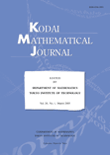
Kodai Mathematical Journal
Illuminating the Path of Mathematical DiscoveryKodai Mathematical Journal is a distinguished publication dedicated to advancing the field of mathematics, particularly in miscellaneous areas. Established in 1949, this esteemed journal has been a reputable source for researchers and practitioners who seek to contribute to the rich landscape of mathematical knowledge. Published by KINOKUNIYA CO LTD, the journal is based in the academic environment of Tokyo Institute of Technology and serves a global audience with rigorous and insightful research articles. Despite its current Q3 quartile ranking in the Scopus Mathematics category, which reflects its niche but impactful contributions, the journal is poised for growth; the convergence of traditional and novel mathematical techniques promises to enhance its relevance further. Researchers, professionals, and students are encouraged to engage with the rich content of the journal, aimed at fostering collaboration and nurturing innovation in the mathematical community. While currently not available as Open Access, Kodai Mathematical Journal remains a critical resource for those passionate about mathematics and its applications.
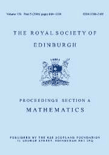
PROCEEDINGS OF THE ROYAL SOCIETY OF EDINBURGH SECTION A-MATHEMATICS
Where Innovative Theories Meet Rigorous ResearchPROCEEDINGS OF THE ROYAL SOCIETY OF EDINBURGH SECTION A-MATHEMATICS is a prestigious journal published by Cambridge University Press, focusing on high-quality research in the field of mathematics. Established in 1975, this journal has carved a niche in the academic community, evidenced by its categorization in the Q1 quartile for Mathematics (miscellaneous) in 2023 and a commendable Scopus rank of #59 out of 399 in General Mathematics, positioning it within the 85th percentile among its peers. The journal serves as a platform for disseminating innovative mathematical theories and methodologies, making it an essential resource for researchers, professionals, and students alike. Though not currently an open-access publication, it offers various access options catering to a broad audience. With a publication timeline extending through to 2024, PROCEEDINGS OF THE ROYAL SOCIETY OF EDINBURGH SECTION A-MATHEMATICS remains committed to advancing mathematical knowledge and fostering a scholarly environment conducive to scientific inquiry and collaboration.

RENDICONTI DEL SEMINARIO MATEMATICO DELLA UNIVERSITA DI PADOVA
Pioneering discoveries in mathematics, one paper at a time.RENDICONTI DEL SEMINARIO MATEMATICO DELLA UNIVERSITA DI PADOVA, published by the European Mathematical Society, stands as a notable open-access journal with a rich history in disseminating research across various domains of mathematics. With an ISSN of 0041-8994 and E-ISSN 2240-2926, this journal has embraced open access since 2023, significantly enhancing its visibility and accessibility to a global audience. Situated in Germany, its publishing house is based at Technical University Berlin, which emphasizes its academic roots and dedication to fostering mathematical research. The journal features a quartile ranking of Q3 across multiple categories including Algebra and Number Theory, Analysis, Geometry and Topology, and Mathematical Physics as of 2023, indicating a vibrant contribution to the field, despite its challenge in specific rankings. Researchers, professionals, and students alike will find in this journal a platform for innovative ideas and significant findings that are crucial to the evolution of modern mathematics.

Revista de la Real Academia de Ciencias Exactas Fisicas y Naturales Serie A-Matematicas
Exploring Innovative Ideas in MathematicsRevista de la Real Academia de Ciencias Exactas Fisicas y Naturales Serie A-Matematicas, published by SPRINGER-VERLAG ITALIA SRL, is a premier academic journal based in Italy that serves as a significant platform for researchers and practitioners in the fields of Mathematics. With a focus on core areas such as Algebra, Analysis, Applied Mathematics, Computational Mathematics, and Geometry and Topology, this journal boasts an impressive performance in academic rankings, achieving Q1 status in multiple categories, reflecting its excellence in disseminating high-quality research. The journal is easily accessible through subscription options and provides a vital resource for the mathematics community, fostering the exploration of innovative ideas and methodologies. The journal’s commitment to advancing mathematical knowledge is evident through its competitive Scopus rankings, including a remarkable rank of #1 in Algebra and Number Theory, placing it in the top percentile of its field. Scholars and students alike will find in this publication a rich source of impactful research that not only contributes to the academic discourse but also enhances the practical applications of mathematics in today's society.
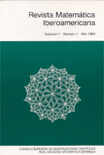
REVISTA MATEMATICA IBEROAMERICANA
Advancing mathematics through innovative research.REVISTA MATEMATICA IBEROAMERICANA, published by the EUROPEAN MATHEMATICAL SOCIETY, is a leading open-access journal dedicated to advancing the field of mathematics. Since its inception in 1996, the journal has provided a platform for high-quality research up to 2024, achieving a prestigious Q1 ranking in the miscellaneous mathematics category and placing it within the top 77th percentile of the Scopus rankings. Based in Spain, this journal fosters a vibrant academic community by disseminating innovative research, theoretical insights, and applications within the broad scope of mathematics. With its commitment to open access established in 2022, REVISTA MATEMATICA IBEROAMERICANA ensures that groundbreaking research is accessible to scholars, practitioners, and students worldwide, emphasizing the importance of collaboration and knowledge sharing in the mathematical sciences. The journal is a vital resource for anyone invested in the evolution of mathematics, providing a rich array of articles that contribute to both the theoretical and applied landscapes of the discipline.
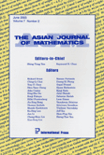
Asian Journal of Mathematics
Shaping the Future of Mathematical InquiryAsian Journal of Mathematics, published by INT PRESS BOSTON, INC, is a premier scholarly journal dedicated to the expansive field of mathematics. With an ISSN of 1093-6106 and E-ISSN 1945-0036, it serves as a crucial platform for disseminating innovative research and methodologies in various mathematical domains. Established in 2005, the journal has garnered a significant reputation, currently holding Q2 rankings in both Applied Mathematics and Mathematics (miscellaneous) categories as of 2023. The journal aims to bridge theoretical research with practical application, making it an essential resource for researchers, professionals, and students seeking to advance their understanding and application of mathematical principles. Although it currently does not offer open access options, the journal's commitment to quality and rigor ensures its place as an influential reference within the mathematical community. Its office is located at PO BOX 43502, SOMERVILLE, MA 02143, United States, strategically positioning it as a key contributor to global mathematical discourse.